Home Trees Indices Help
Package pyspark :: M odule rdd :: Class RDD
Class RDD
source code
object --+ | RDD
Spark
1.0.2
Python
API
Docs
[frames]
|
no
frames]
A Resilient Distributed Dataset (RDD), the basic abstraction in Spark. Represents
an immutable, partitioned collection of elements that can be operated on in
parallel.
Instance Methods
__init__(self, jrdd, ctx, jrdd_deserializer)
x.__init__(...)
initializes
x;
see
help(type(x))
for
signature
id(self)
A
unique
ID
for
this
RDD
(within
its
SparkContext).
__repr__(self)
repr(x)
context(self)
The
SparkContext
that
this
RDD
was
created
on.
cache(self)
Persist
this
RDD
with
the
default
storage
level
(MEMORY_ONLY).
persist(self, storageLevel)
Set
this
RDD's
storage
level
to
persist
its
values
across
operations
after
the
first
time
it
is
computed.
unpersist(self)
Mark
the
RDD
as
non-‐persistent,
and
remove
all
blocks
for
it
from
memory
and
disk.
checkpoint(self)
Mark
this
RDD
for
checkpointing.
isCheckpointed(self)
Return
whether
this
RDD
has
been
checkpointed
or
not
source
code
source
code
source
code
source
code
source
code
source
code
source
code
source
code
source
code
�
mapPartitionsWithSplit(self, f, preservesPartitioning=
mapPartitionsWithIndex(self, f, preservesPartitioning=
getCheckpointFile(self)
Gets
the
name
of
the
file
to
which
this
RDD
was
checkpointed
map(self, f, preservesPartitioning=False)
Return
a
new
RDD
by
applying
a
function
to
each
element
of
this
RDD.
flatMap(self, f, preservesPartitioning=False)
Return
a
new
RDD
by
first
applying
a
function
to
all
elements
of
this
RDD,
and
then
flattening
the
results.
mapPartitions(self, f, preservesPartitioning=False)
Return
a
new
RDD
by
applying
a
function
to
each
partition
of
this
RDD.
False)
Return
a
new
RDD
by
applying
a
function
to
each
partition
of
this
RDD,
while
tracking
the
index
of
the
original
partition.
False)
Deprecated:
use
mapPartitionsWithIndex
instead.
filter(self, f)
Return
a
new
RDD
containing
only
the
elements
that
satisfy
a
predicate.
distinct(self)
Return
a
new
RDD
containing
the
distinct
elements
in
this
RDD.
sample(self, withReplacement, fraction, seed=None)
Return
a
sampled
subset
of
this
RDD
(relies
on
numpy
and
falls
back
on
default
random
generator
if
numpy
is
unavailable).
takeSample(self, withReplacement, num, seed=None)
Return
a
fixed-‐size
sampled
subset
of
this
RDD
(currently
requires
numpy).
union(self, other)
Return
the
union
of
this
RDD
and
another
one.
intersection(self, other)
Return
the
intersection
of
this
RDD
and
another
one.
__add__(self, other)
Return
the
union
of
this
RDD
and
another
one.
source
code
source
code
source
code
source
code
source
code
source
code
source
code
source
code
source
code
source
code
source
code
source
code
source
code
�
sortByKey(self, ascending=True, numPartitions=None, key
func=lambda x: x)
Sorts
this
RDD,
which
is
assumed
to
consist
of
(key,
value)
pairs.
glom(self)
Return
an
RDD
created
by
coalescing
all
elements
within
each
partition
into
a
list.
cartesian(self, other)
Return
the
Cartesian
product
of
this
RDD
and
another
one,
that
is,
the
RDD
of
all
pairs
of
elements(a, b)
where
a
is
in
self
and
b
is
in
other.
groupBy(self, f, numPartitions=None)
Return
an
RDD
of
grouped
items.
pipe(self, command, env={})
Return
an
RDD
created
by
piping
elements
to
a
forked
external
process.
foreach(self, f)
Applies
a
function
to
all
elements
of
this
RDD.
foreachPartition(self, f)
Applies
a
function
to
each
partition
of
this
RDD.
collect(self)
Return
a
list
that
contains
all
of
the
elements
in
this
RDD.
reduce(self, f)
Reduces
the
elements
of
this
RDD
using
the
specified
commutative
and
associative
binary
operator.
fold(self, zeroValue, op)
Aggregate
the
elements
of
each
partition,
and
then
the
results
for
all
the
partitions,
using
a
given
associative
function
and
a
neutral
"zero
value."
aggregate(self, zeroValue, seqOp, combOp)
Aggregate
the
elements
of
each
partition,
and
then
the
results
for
all
the
partitions,
using
a
given
combine
functions
and
a
neutral
"zero
value."
max(self)
Find
the
maximum
item
in
this
RDD.
min(self)
Find
the
maximum
item
in
this
RDD.
source
code
source
code
source
code
source
code
source
code
source
code
source
code
source
code
source
code
source
code
source
code
source
code
source
code
�
sum(self)
Add
up
the
elements
in
this
RDD.
count(self)
Return
the
number
of
elements
in
this
RDD.
stats(self)
Return
a
StatCounter
object
that
captures
the
mean,
variance
and
count
of
the
RDD's
elements
in
one
operation.
mean(self)
Compute
the
mean
of
this
RDD's
elements.
variance(self)
Compute
the
variance
of
this
RDD's
elements.
stdev(self)
Compute
the
standard
deviation
of
this
RDD's
elements.
sampleStdev(self)
Compute
the
sample
standard
deviation
of
this
RDD's
elements
(which
corrects
for
bias
in
estimating
the
standard
deviation
by
dividing
by
N-‐1
instead
of
N).
sampleVariance(self)
Compute
the
sample
variance
of
this
RDD's
elements
(which
corrects
for
bias
in
estimating
the
variance
by
dividing
by
N-‐1
instead
of
N).
countByValue(self)
Return
the
count
of
each
unique
value
in
this
RDD
as
a
dictionary
of
(value,
count)
pairs.
top(self, num)
Get
the
top
N
elements
from
a
RDD.
takeOrdered(self, num, key=None)
Get
the
N
elements
from
a
RDD
ordered
in
ascending
order
or
as
specified
by
the
optional
key
function.
take(self, num)
Take
the
first
num
elements
of
the
RDD.
first(self)
Return
the
first
element
in
this
RDD.
source
code
source
code
source
code
source
code
source
code
source
code
source
code
source
code
source
code
source
code
source
code
source
code
source
code
�
saveAsTextFile(self, path)
source
code
Save
this
RDD
as
a
text
file,
using
string
representations
of
elements.
collectAsMap(self)
source
code
Return
the
key-‐value
pairs
in
this
RDD
to
the
master
as
a
dictionary.
keys(self)
source
code
Return
an
RDD
with
the
keys
of
each
tuple.
values(self)
source
code
Return
an
RDD
with
the
values
of
each
tuple.
reduceByKey(self, func, numPartitions=None)
source
code
Merge
the
values
for
each
key
using
an
associative
reduce
function.
reduceByKeyLocally(self, func)
source
code
Merge
the
values
for
each
key
using
an
associative
reduce
function,
but
return
the
results
immediately
to
the
master
as
a
dictionary.
countByKey(self)
source
code
Count
the
number
of
elements
for
each
key,
and
return
the
result
to
the
master
as
a
dictionary.
join(self, other, numPartitions=None)
source
code
Return
an
RDD
containing
all
pairs
of
elements
with
matching
keys
in
self
and
other.
leftOuterJoin(self, other, numPartitions=None)
source
code
Perform
a
left
outer
join
of
self
and
other.
rightOuterJoin(self, other, numPartitions=None)
source
code
Perform
a
right
outer
join
of
self
and
other.
source
code
e_hash)
Return
a
copy
of
the
RDD
partitioned
using
the
specified
partitioner.
source
iners, numPartitions=None)
code
Generic
function
to
combine
the
elements
for
each
key
using
a
custom
set
of
aggregation
functions.
foldByKey(self, zeroValue, func, numPartitions=None)
Merge
the
values
for
each
key
using
an
associative
function
"func"
and
a
source
code
combineByKey(self, createCombiner, mergeValue, mergeComb
partitionBy(self, numPartitions, partitionFunc=portabl
�
neutral
"zeroValue"
which
may
be
added
to
the
result
an
arbitrary
number
of
times,
and
must
not
change
the
result
(e.g.,
0
for
addition,
or
1
for
multiplication.).
groupByKey(self, numPartitions=None)
Group
the
values
for
each
key
in
the
RDD
into
a
single
sequence.
flatMapValues(self, f)
Pass
each
value
in
the
key-‐value
pair
RDD
through
a
flatMap
function
without
changing
the
keys;
this
also
retains
the
original
RDD's
partitioning.
mapValues(self, f)
Pass
each
value
in
the
key-‐value
pair
RDD
through
a
map
function
without
changing
the
keys;
this
also
retains
the
original
RDD's
partitioning.
groupWith(self, other)
Alias
for
cogroup.
cogroup(self, other, numPartitions=None)
For
each
key
k
in
self
or
other,
return
a
resulting
RDD
that
contains
a
tuple
with
the
list
of
values
for
that
key
in
self
as
well
as
other.
subtractByKey(self, other, numPartitions=None)
Return
each
(key,
value)
pair
in
self
that
has
no
pair
with
matching
key
in
other.
subtract(self, other, numPartitions=None)
Return
each
value
in
self
that
is
not
contained
in
other.
keyBy(self, f)
Creates
tuples
of
the
elements
in
this
RDD
by
applying
f.
repartition(self, numPartitions)
Return
a
new
RDD
that
has
exactly
numPartitions
partitions.
coalesce(self, numPartitions, shuffle=False)
Return
a
new
RDD
that
is
reduced
into
`numPartitions`
partitions.
zip(self, other)
Zips
this
RDD
with
another
one,
returning
key-‐value
pairs
with
the
first
element
in
each
RDD
second
element
in
each
RDD,
etc.
name(self)
Return
the
name
of
this
RDD.
source
code
source
code
source
code
source
code
source
code
source
code
source
code
source
code
source
code
source
code
source
code
source
code
�
setName(self, name)
Assign
a
name
to
this
RDD.
toDebugString(self)
A
description
of
this
RDD
and
its
recursive
dependencies
for
debugging.
getStorageLevel(self)
Get
the
RDD's
current
storage
level.
source
code
source
code
source
code
Inherited
from object: __delattr__, __format__, __getattribute__, __hash__, __new__, __reduce__, __r
educe_ex__, __setattr__, __sizeof__,__str__, __subclasshook__
Properties
Inherited from object: __class__
Method Details
__init__(self, jrdd, ctx, jrdd_deserializer)
(Constructor)
x.__init__(...) initializes x; see help(type(x)) for signature
Overrides:
object.__init__
(inherited
documentation)
__repr__(self)
(Representation operator)
repr(x)
Overrides:
object.__repr__
(inherited
documentation)
context(self)
The SparkContext that this RDD was created on.
Decorators:
• @property
persist(self, storageLevel)
Set this RDD's storage level to persist its values across operations after the first time it is computed. This can only be used to
source
code
source
code
source
code
source
code
�
assign a new storage level if the RDD does not have a storage level set yet.
checkpoint(self)
Mark this RDD for checkpointing. It will be saved to a file inside the checkpoint directory set
with SparkContext.setCheckpointDir()and all references to its parent RDDs will be removed. This function must be
called before any job has been executed on this RDD. It is strongly recommended that this RDD is persisted in memory, otherwise
saving it on a file will require recomputation.
map(self, f, preservesPartitioning=False)
Return a new RDD by applying a function to each element of this RDD.
>>> rdd = sc.parallelize(["b", "a", "c"]) >>> sorted(rdd.map(lambda x: (x,
1)).collect()) [('a', 1), ('b', 1), ('c', 1)]
flatMap(self, f, preservesPartitioning=False)
Return a new RDD by first applying a function to all elements of this RDD, and then flattening the results.
source
code
>>> rdd = sc.parallelize([2, 3, 4]) >>> sorted(rdd.flatMap(lambda x: range(1,
x)).collect()) [1, 1, 1, 2, 2, 3] >>> sorted(rdd.flatMap(lambda x: [(x, x), (x,
x)]).collect()) [(2, 2), (2, 2), (3, 3), (3, 3), (4, 4), (4, 4)]
source
code
source
code
source
code
source
code
source
code
mapPartitions(self, f, preservesPartitioning=False)
Return a new RDD by applying a function to each partition of this RDD.
>>> rdd = sc.parallelize([1, 2, 3, 4], 2) >>> def f(iterator): yield sum(iterator) >>>
rdd.mapPartitions(f).collect() [3, 7]
mapPartitionsWithIndex(self, f, preservesPartitioning=False)
Return a new RDD by applying a function to each partition of this RDD, while tracking the index of the original partition.
>>> rdd = sc.parallelize([1, 2, 3, 4], 4) >>> def f(splitIndex, iterator): yield
splitIndex >>> rdd.mapPartitionsWithIndex(f).sum() 6
mapPartitionsWithSplit(self, f, preservesPartitioning=False)
�
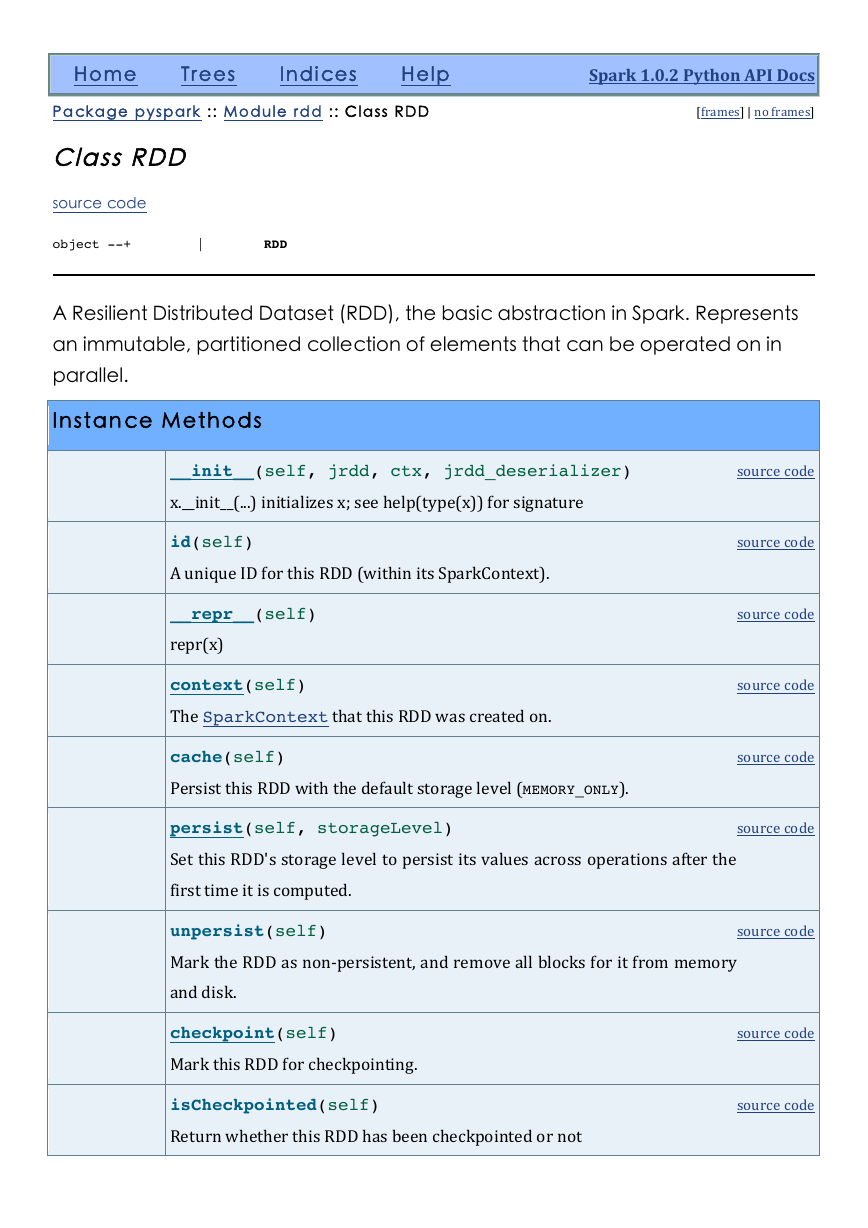
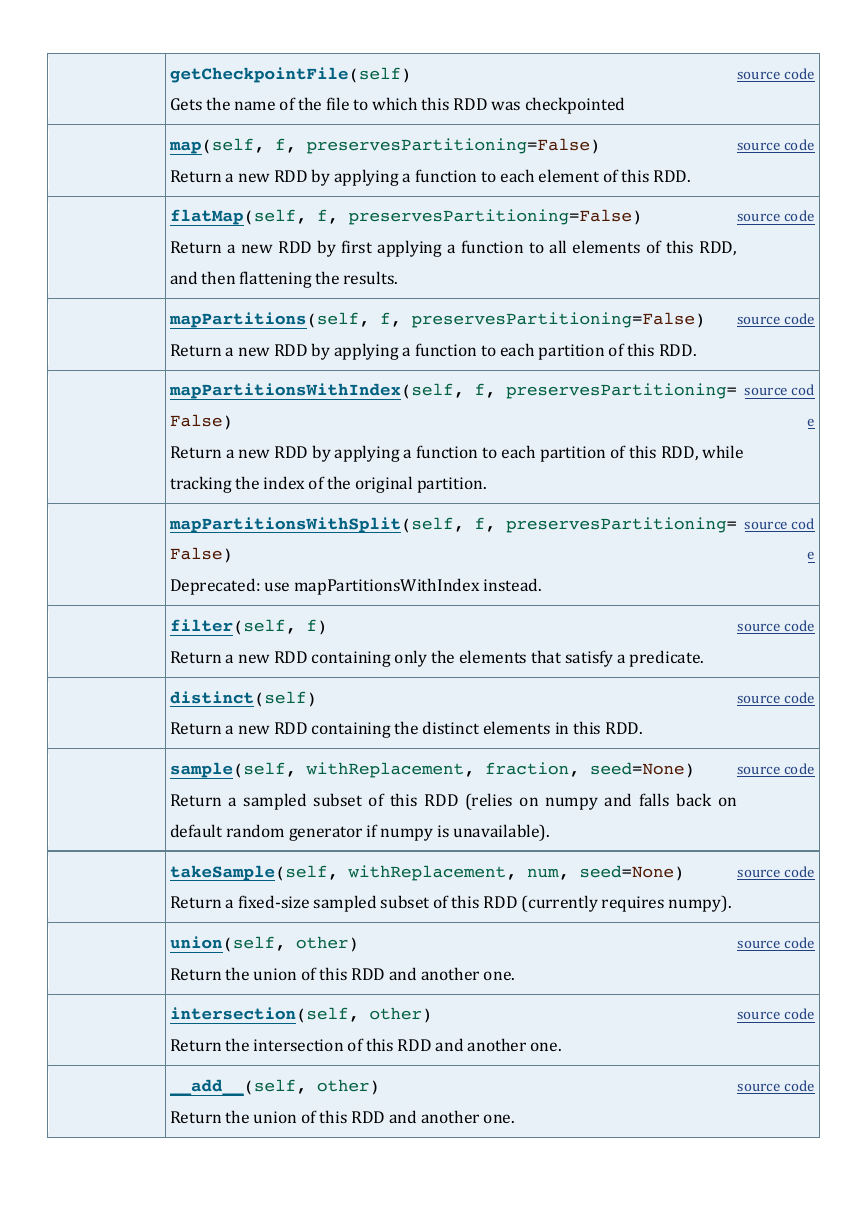
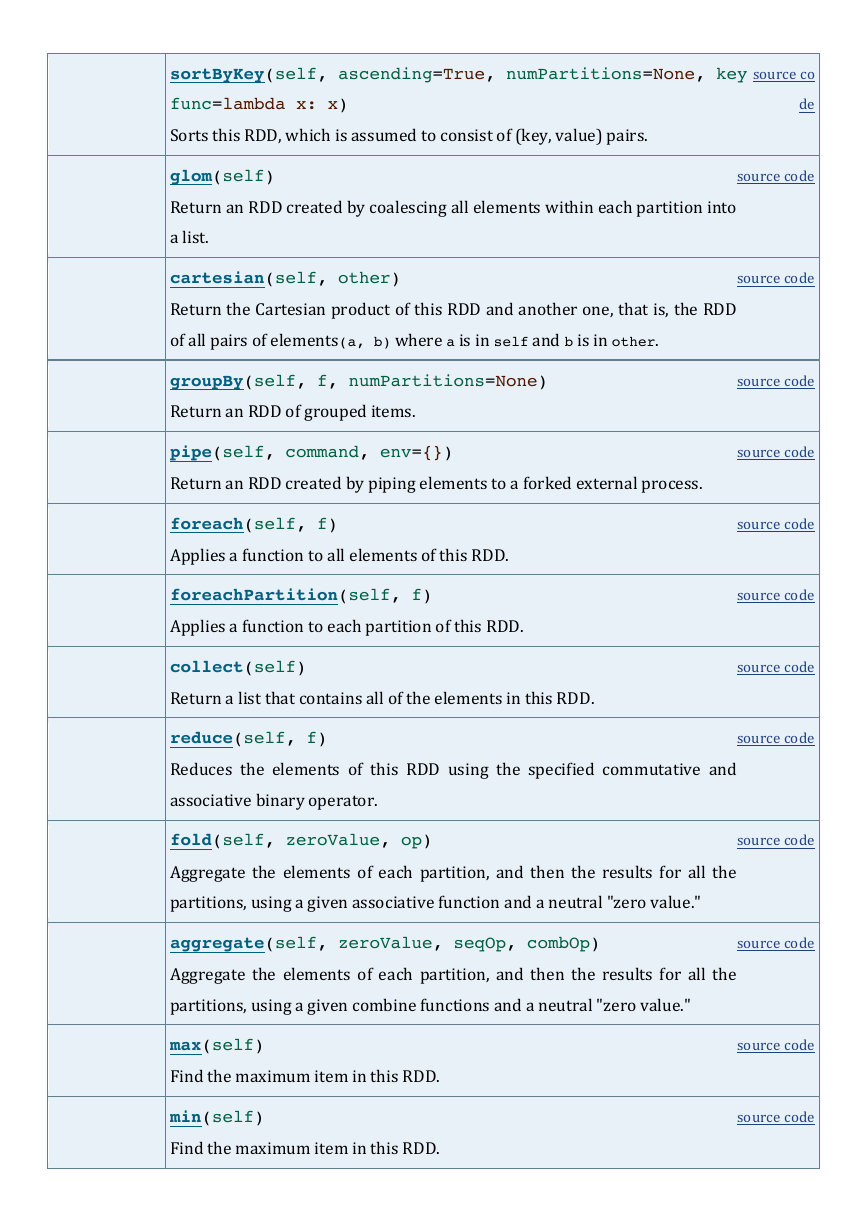
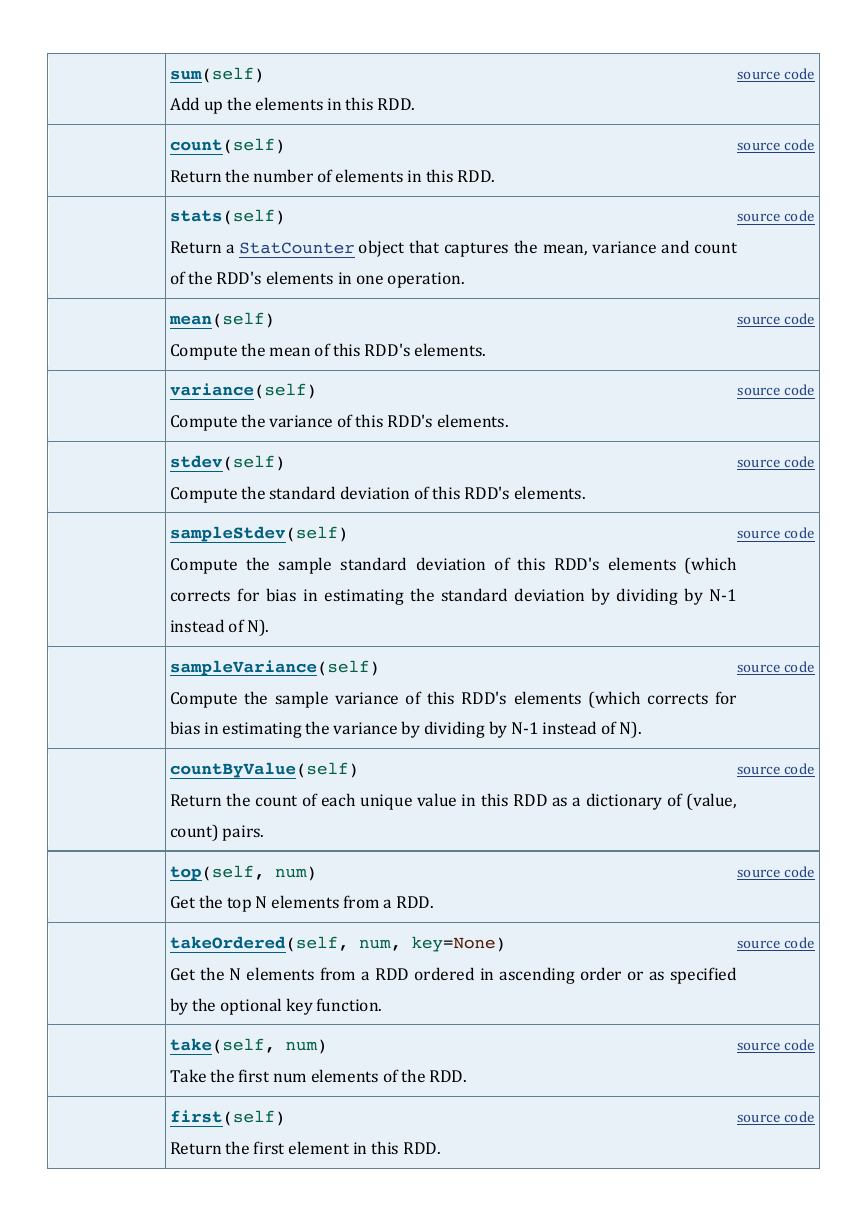
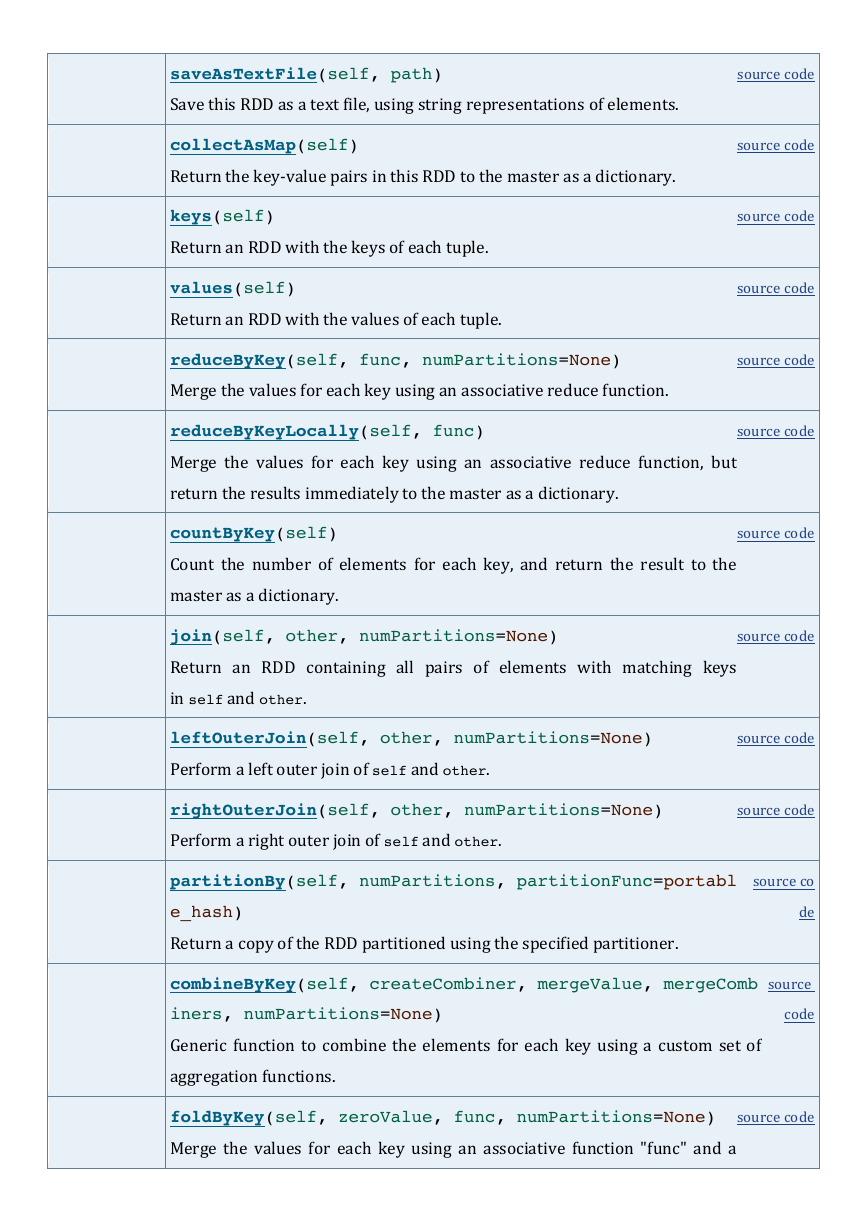
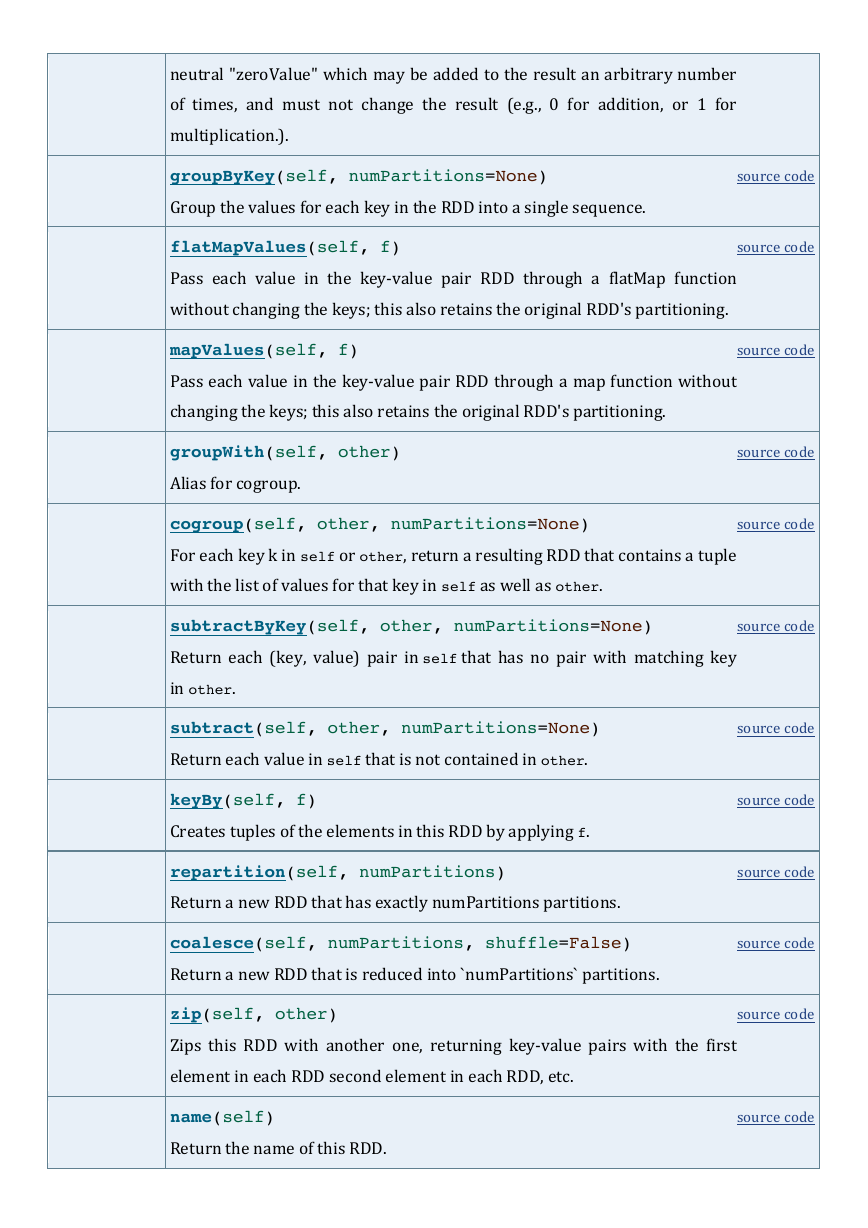
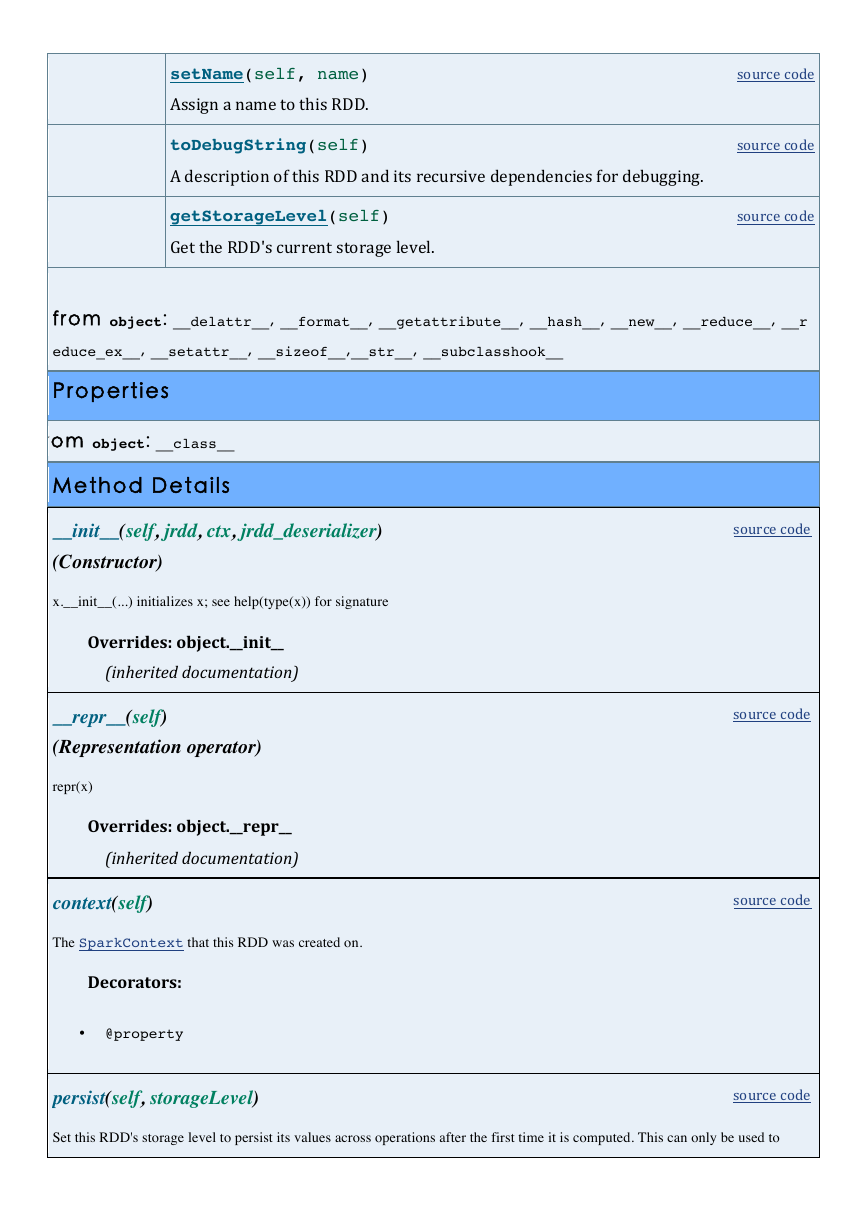
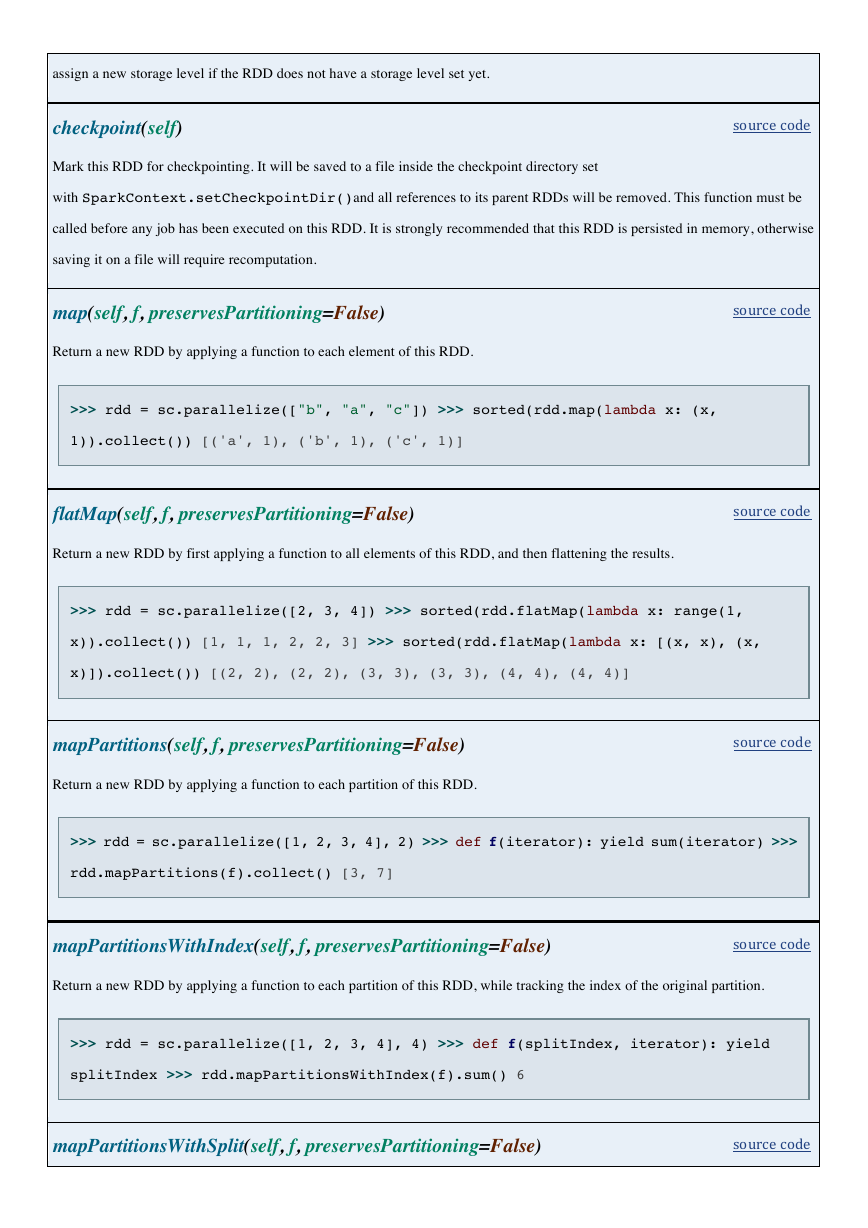








 2023年江西萍乡中考道德与法治真题及答案.doc
2023年江西萍乡中考道德与法治真题及答案.doc 2012年重庆南川中考生物真题及答案.doc
2012年重庆南川中考生物真题及答案.doc 2013年江西师范大学地理学综合及文艺理论基础考研真题.doc
2013年江西师范大学地理学综合及文艺理论基础考研真题.doc 2020年四川甘孜小升初语文真题及答案I卷.doc
2020年四川甘孜小升初语文真题及答案I卷.doc 2020年注册岩土工程师专业基础考试真题及答案.doc
2020年注册岩土工程师专业基础考试真题及答案.doc 2023-2024学年福建省厦门市九年级上学期数学月考试题及答案.doc
2023-2024学年福建省厦门市九年级上学期数学月考试题及答案.doc 2021-2022学年辽宁省沈阳市大东区九年级上学期语文期末试题及答案.doc
2021-2022学年辽宁省沈阳市大东区九年级上学期语文期末试题及答案.doc 2022-2023学年北京东城区初三第一学期物理期末试卷及答案.doc
2022-2023学年北京东城区初三第一学期物理期末试卷及答案.doc 2018上半年江西教师资格初中地理学科知识与教学能力真题及答案.doc
2018上半年江西教师资格初中地理学科知识与教学能力真题及答案.doc 2012年河北国家公务员申论考试真题及答案-省级.doc
2012年河北国家公务员申论考试真题及答案-省级.doc 2020-2021学年江苏省扬州市江都区邵樊片九年级上学期数学第一次质量检测试题及答案.doc
2020-2021学年江苏省扬州市江都区邵樊片九年级上学期数学第一次质量检测试题及答案.doc 2022下半年黑龙江教师资格证中学综合素质真题及答案.doc
2022下半年黑龙江教师资格证中学综合素质真题及答案.doc